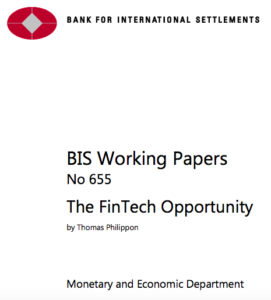Fintech has the potential to improve both financial stability and access to services. But for the sector to thrive, there needs to be significant changes in the focus of regulation, according to a new Bank for International Settlements (BIS) Working Paper.
 The paper, written by French economist and professor of finance at New York University, Stern School of Business, Thomas Philippon, explores the potential impact of fintech on the finance industry.
The paper, written by French economist and professor of finance at New York University, Stern School of Business, Thomas Philippon, explores the potential impact of fintech on the finance industry.
Titled “The Fintech Opportunity,” the report argues that the current financial system is rather inefficient. Many advanced economies have reached a point where “‘more finance’ is not helpful.” Yet, significant welfare gains from improvement in financial services are technologically feasible with the entry of new firms.
Information technologies have benefited the financial and banking sector more than other industries. However, these improvements have not been passed on as lower costs to the end users of financial services.
“Financial services remain expensive and financial innovations have not delivered significant benefits to consumers,” the report says.
“The point is not that finance does not innovate. It does. But these innovations have not improved the overall efficiency of the system.”
Furthermore, the lack of entry and competition has been an endemic problem in finance in recent decades.
These have fueled the emergence of fintech. Fintech companies leverage digital platforms and cutting-edge technologies to improve access to financial services, provide much cheaper products, and offer solutions that are more appealing to younger, digitally-savvy generations.
“The key advantage of startups is that they are not held back by existing systems and are willing to make risky choices,” the report says.
“Fintech startups have the chance to build the right systems from the start. Moreover, they share a culture of efficient operational design that many incumbents do not have.”
Fintech regulation

Image: Regulation by Nick Youngson via Creative Commons Images
The documents argues that the current regulatory approach is subject to significant political economy and coordination costs, therefore unlikely to deliver much structural change.
It suggests considering an alternative approach to financial regulation that focuses on the idea that encouraging entry and shaping the development of new systems might be the best way to solve the remaining challenges in financial regulations.
This involves focusing on new entrants and taking advantage of the ongoing development of fintech. The main idea would be to achieve bottom-up structural change by encouraging, for instance, firms that provide transaction services without leverage, and trading systems that are cheap, transparent and open-access.
In particular, the document advises the following guidelines for fintech regulation:
Encourage entry and beware of “a narrow approach to level-playing-field”: regulators should encourage entry in regions of the financial system where incumbents are entrenched, where entry is difficult, and where change is particularly needed.
Promote low leverage: today’s new technologies open new possibilities. We can assess the value of many financial assets in real time, and we can settle payments almost instantly. New systems would not need to rely on fixed nominal value deposits like the old system did.
Keep incumbents in check: we need to make sure that incumbents are not large enough to prevent entry. Incumbents will try to acquire fintech firms. They will also try to turn open system such as blockchains into closed ones. It is already happening but should be discouraged. Fintechs need to create new systems to reduce the industry’s reliance on the old ones.
Perfect is the enemy of good: even in the best-case scenario, fintech is likely to create new issues. Robo-advisor for example does not need to be perfect; it only needs to be better than the current system.
Featured image: Fintech, by CafeCredit under CC 2.0, via Flickr.
The post Proper Regulation Needed For Fintech To Thrive And Fix Our Financial System appeared first on Fintech Schweiz Digital Finance News - FintechNewsCH.
Comments